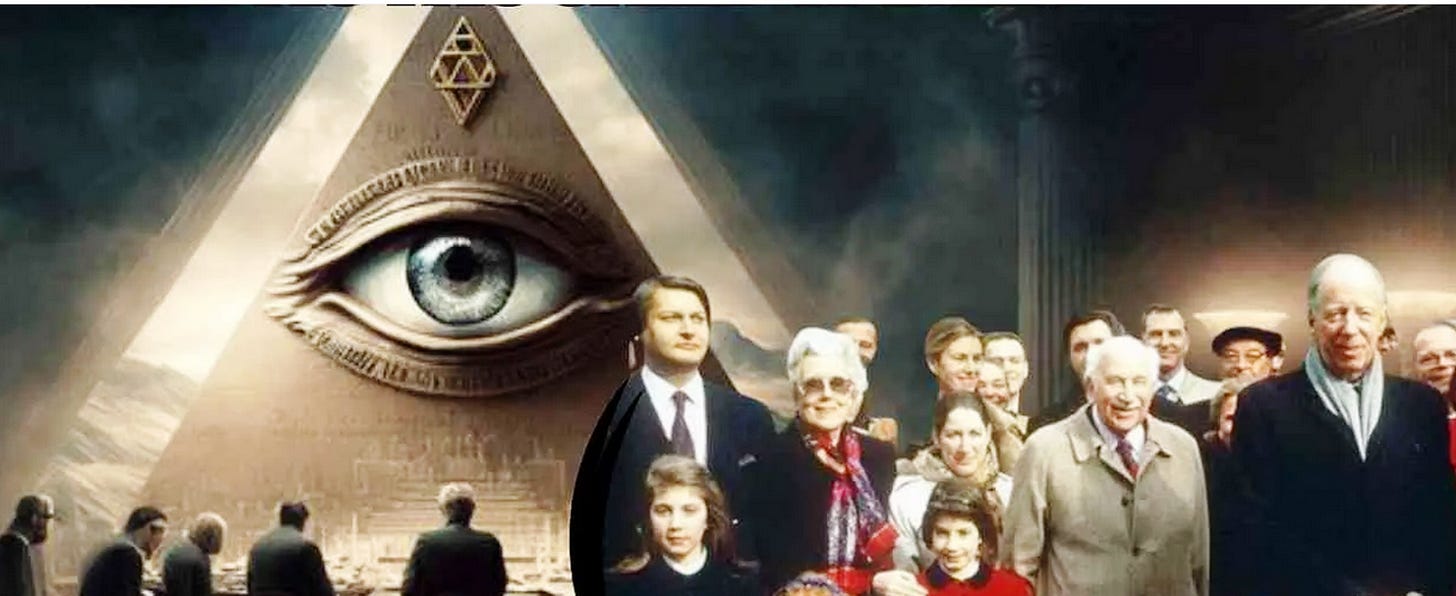The Rothschild Family: Navigating History & Unraveling Famous Conspiracy Theories
The Rothschild family conspiracy theories, though captivating, should be approached with skepticism.
December 23, 2023
The Rothschild Family’s Banking Dynasty, tracing its roots to the modest confines of 18th-century Frankfurt, Germany, has etched a profound narrative across the annals of international finance.
This exploration delves into the family’s multi-century journey, characterized by financial ingenuity, strategic acumen, and a relentless pursuit of a lasting legacy.
Concurrently, we scrutinize the persistent conspiracy theories that envelop the Rothschild family, endeavoring to meticulously separate historical facts from the intricate web of conjecture.
Modest Beginnings and Financial Ingenuity
Mayer Amschel Rothschild, navigating societal constraints in 18th-century Frankfurt, initiated his trajectory as a textile trader.
The realization of the profitability inherent in front running within the financial realm prompted his transition to gold coin and antique trading.
Ascending to the position of investment manager for Prince William of Hesse-Kassel, Mayer’s accumulated fortune by 1782 became the seed for envisioning a familial legacy transcending mere wealth accumulation.
Expanding Across Europe
In a bid to secure enduring prosperity, Mayer strategically dispatched four of his five sons to pivotal European capitals.
Nathan Rothschild, stationed in London, not only seized upon the burgeoning textile industry but, with acumen, transformed the family enterprise into a bank.
This transformative move laid the groundwork for the Rothschild Banking Dynasty’s ascendancy to global influence.
Pioneering currency speculation, the family utilized private carriers and insider information to stay ahead in the dynamic financial landscape.
Railroads, War Financing, and Changing Dynamics
The mid-1800s witnessed a strategic shift under James Rothschild, redirecting the family’s focus towards the burgeoning railroad industry.
Financing numerous railway ventures, the Rothschilds deftly utilized other people’s capital to mitigate risks.
Their success persisted through adept war financing during the conflicts of the 19th century, leveraging an extensive network of banking houses for a unique advantage in navigating the turbulent times.
Challenges and Evolution in the 20th Century
As the 1800s transitioned into the 1900s, the Rothschild family encountered internal challenges and a world in flux.
World War I brought both windfalls and personal losses, while the emergence of formidable competitors, notably the House of Morgan, presented new operational challenges.
The family’s resilience faced a severe test during World War II as assets were seized, and family members engaged in resistance movements. The post-war era ushered in a new banking landscape, demanding adaptation and evolution.
Adaptation and Diversification in the 21st Century
Fast-forwarding to 2023, the Rothschild family’s legacy endures, marked by diversification beyond traditional banking.
Their interests span wealth and asset management, private equity, and philanthropy, echoing a unique ability to balance financial pursuits with a visionary, long-term familial legacy.
What once began as a network of banking establishments in major European cities has now blossomed into a global financial influence.
Unraveling the Rothschild Family Conspiracy Theories
Persistent conspiracy theories have shrouded the Rothschilds in an aura of mystery.
Claims depicting them as puppet masters orchestrating global events, steering wars, and manipulating economies have endured.
Allegations of seeking global control and conspiring to establish a New World Order persist, often accompanied by disturbing anti-Semitic undertones.
It is essential to scrutinize these theories with a discerning eye, acknowledging the family’s historical influence while recognizing the complexity of geopolitical and economic forces that drive global events.
The Banking Empire as a Puppet Master
One of the enduring conspiracy theories suggests that the Rothschilds operate as puppet masters, manipulating world events to serve their financial interests.
According to these claims, the family allegedly orchestrated major historical events, including wars and economic crises, to control governments and increase their wealth.
While it is true that the Rothschilds played a significant role in financing various wars and had unparalleled influence in financial circles, the idea of them orchestrating global events from behind the scenes oversimplifies the complex dynamics of geopolitical and economic forces.
The family’s financial acumen often led to advantageous positions, but attributing all global conflicts to a single family oversimplifies the intricate web of historical causation.
Allegations of Global Control and the New World Order
Conspiracy theorists often assert that the Rothschilds are at the helm of a secret global cabal seeking to establish a New World Order.
This narrative contends that the family, through their vast wealth and interconnected network, aims to control governments, economies, and societies on a global scale.
In reality, the idea of a secretive world-controlling organization headed by the Rothschilds lacks substantial evidence.
While the family undoubtedly held significant influence in financial circles, the notion of them orchestrating a grand plan for global dominance involves assumptions that extend beyond available evidence.
Anti-Semitic Undertones and Historical Context
The Rothschild family conspiracy theories carry a disturbing anti-Semitic undertone, perpetuating harmful stereotypes about Jewish people.
These unfounded claims often tap into historical prejudices, exploiting societal fears and anxieties. It is essential to approach these conspiracy theories with caution, recognizing their potential to fuel hatred and discrimination.
The Rothschild Family’s Response
Consistent in their denial of conspiracy theories, the Rothschild family asserts that their success stems from financial acumen, innovation, and adaptability rather than a clandestine global agenda.
Public statements underscore their commitment to philanthropy and ethical business practices, providing a counter-narrative to the speculative claims that have pervaded public discourse.
Separating Fact from Fiction
While acknowledging the historical influence of the Rothschild family in banking and finance, it is crucial to distinguish between verifiable facts and speculative claims.
The complexity of global events and the multitude of factors shaping them cannot be reduced to a singular narrative centered around a single family.
In conclusion, the Rothschild family conspiracy theories, though captivating, should be approached with skepticism.
Separating fact from fiction requires a nuanced understanding of historical events and a recognition of the dangers inherent in perpetuating unfounded claims, especially when they carry harmful stereotypes and anti-Semitic undertones.
The enduring legacy of the Rothschild family is better understood through a historical lens that considers their financial achievements, adaptability, and contributions to the evolution of global finance.
Let’s engage in thoughtful discourse, encouraging open-minded discussions that consider various perspectives on this intriguing chapter of the Rothschild family.
READ MORE:
The Latest Epstein Revelations Expose the Crumbling Rothschild Khazarian Mafia Pedo-Empire, Part 2
Evelyn de Rothschild and Lynn Forester de Rothschild honeymooned at the Clinton White House. Because nothing says “I rule America” like being able to use the Executive Mansion as your bridal suite.
The Rothschild Deep State Cabal Is Imploding
The American Revolution may have been fought for independence from King George’s British monarchy, but not independence from the Rothschild central banking cartel, whose controlling 70% foreign interests in First Bank of America indebted America’s earliest citizens.









